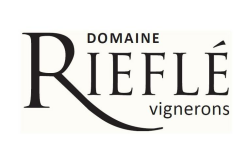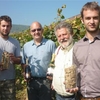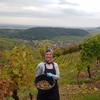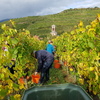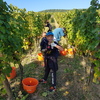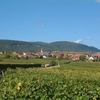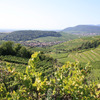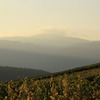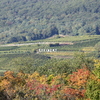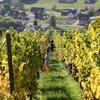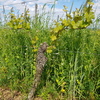Riefle
The Rieflé family is deeply rooted in the history and culture of the Rhine. The domaine's very identity is inspired by the spirit of its beautiful winemaker’s house which was built in PFAFFENHEIM in 1609. It sits next to a magnificent church with a 13th century choir, the quintessence of Roman architecture.
Six generations have built the family's winemaking tradition since it began in 1850.
The first pages of this contemporary story, during which two global conflicts took place, were written by Joseph Rieflé (1908-2006) and his wife Madeleine Freytag (1909-1988). Marthe and René Rieflé then took over the family business and grew the reputation of its wines throughout France.
From the 1980’s, Annick and Jean-Claude Rieflé and their dedicated team made the most of the new opportunities created by the E.U. and the beginnings of globalisation, introducing the domaine's Alsatian wines to new consumers. They were joined at the domaine by their sons, Thomas and Paul, in 2009 and 2010. Thomas manages the vineyard and Paul is responsible for building the business.
The two brothers share a humanist and socially responsible approach to winemaking. Faced with the realities of a global market, they took inspiration from the famous quote by Antoine de Saint-Exupéry: "We do not inherit the Earth from our ancestors, we borrow it from our children''.
They developed and certified the entire vineyard in accordance with Organic Agriculture specifications.
The history of Alsace wines has been shaped by the turbulent history of the Region. Coveted throughout history for its assets and riches, Alsace flourishes in its originality and stands out today as one of the centers of gravity of Europe.
At the crossroads of Germany and Switzerland, Alsace is at the heart of a tri national environment, that of the Upper Rhine. Its border geographic location places it at the heart of a dynamic European flow and trade that gives it access to 300 million consumers within a 900 km radius.
• 3rd century AC: the first vines in Alsace are brought by the romans. Wine is mostly consumed by the roman troops keeping the eastern border (Rhine river) of the Roman Empire. At that time, Strasbourg is a roman camp called Argentoratum.
• 9th – 16th centuries AC: the vineyards are developed and ruled by the Monastic Orders during the Carolingian period (Charlemagne). It is a golden age for Alsace wines which are exported to Northern and Eastern countries of Europe through Ill and Rhine rivers
• 1618 – 1648: 30 Years War: Vineyard is destructed by war, robbery, famine and pest. In 1648 the “Traité de Westphalie” is signed, Strasbourg and the Southern part of Alsace become French. This is a major change in Alsace wines trade flows.
• 1870 – 1871: France is in war against Germany. It is a defeat for France and Alsace-Lorraine become German again. During the following decades, single varietal wines are developing and replace field-blended wines carrying the name of their place of origin. The Alsatian vineyard is mostly dedicated to the production of mass-wine of poor quality.
• 1914 – 1918: After the first world war, Alsace become French again but the region suffered a lot from the war. Moreover, the trade flows change again.
• 1939 - 1945: Second World War. A part of the vineyard and many villages are destroyed especially around Colmar, where Nazis fought hard before crossing back the Rhine. In Pfaffenheim, the church clock tower paid a tribute to the Liberation: The US 12th Armoured Division passing by blew it down. In Abilene (Tx), today home of the 12th, a veteran told us that “blowing down clocktowers was a common sport at this time…” The end of the war marks the beginning of the reconstruction.
• November 2nd, 1945: Origin Appellation « Vin d’Alsace » is created
• October 3rd, 1962: “Vin d’Alsace” becomes a controlled appellation
• July 5th, 1972: It is decided that Alsace Wine cannot leave its production area other than in the traditional Alsatian glass bottle.
• November 20th 1975: Creation of the AOC Alsace Grand Cru
• August 24th 1976: Creation of the AOC Crémant d’Alsace.
Our vineyard covers 23ha (57 acres), spread out in more than 70 blocks of vineyards. Each of these blocks is a specific terroir. They were all created tens of millions of years before our “modern” history.
Our most beautiful terroir in Pfaffenheim is the Grand Cru Steinert. STEINERT literally refers to the stony nature of the terroir. It lies opposite the Alsace plain, the Rhine and the Black Forest and faces towards the rising sun. The hard, homogeneous, dry and filtering soil sits directly on the oolithic (-170 Myr) limestone bedrock which is partially visible on the surface. Wines from the Steinert vineyards are characterised by their powerful structure combined with a subtle finesse and underlying menthol notes. Steinert was predestined to produce wines for religious communities, including the Muri Abbey in Switzerland (birthplace of the Habsburg dynasty) around 1000 AD.
Philosophy
Domaine Rieflé is a small affair driven by family spirit and responsible approach to winemaking. Faced with the realities of a global market, Antoine de Saint-Exupéry is a good inspiration. He said: «We do not inherit the Earth from our ancestors, we borrow it from our children». In Organic Agriculture, man and his work play a central role in the creation of fine wines. As part of the domaine’s humanist approach and support for the local community, manual work is outsourced to a local association for professional integration. This coherent and modern viticultural vision also engenders a strong identity which cannot be delocalised and which is a guarantee of sustainability in a rapidly changing world.
Our vineyard, with a total area of 23 ha (57 acres), covers more than 70 plots spread over Pfaffenheim Rouffach, Soultzmatt and Westhalten in the AOP Alsace, Alsace Côte de Rouffach, several single — 1er Crus Vineyards and in two Grands Crus: Zinnkoepflé and Steinert. We take care of the plots of vines individually according to their unique characteristics in order to strengthen the connection between the terroir and the wine it produces.
This connection, signature of a great wine, is favoured by the adoption of so-called soil conservation techniques. Instead tilling, maintaining permanent cover composed of specific plants (rye, pea, vetch, radish...), allows the soil to become autonomous in term of amendments (neither chemical nor organic fertilizers are used). In accordance with the Organic Agriculture (AB) charter, no pesticide or other synthetic chemical product is used in the vineyards.
Biography
At Domaine Rieflé, it is all about familly work, 2 Brothers and their parents working hand in hand.
Thomas RIEFLE was born in 1988. He studied viticulture and oenology in Montpellier and after being graduated with an Advanced Technician's Certificate in 2008, he took the position of Vineyard Manager’s assistant at Schlumberger, the largest organic certified Domaine in Alsace at that time. He joined the family adventure in 2009 to convert the vineyard to organic farming, and later to soil conservation technics. Thomas is passionate in the understanding of the laws of the living. He reads huge quantities of books and listen hours of podcasts when he prunes the vines. During its spare-times, he loves to take his metal detector and walk the forest to find artefacts from the Romans or Middle-Age periods. He became very knowledgeable about history!
Paul RIEFLE was born in 1986. He has a master’s degree in Business Management from Bordeaux Business School (KEDGE). After several internships at Champagne Mumm Perrier-Jouët, Champagne Bruno Paillard and Pernod Ricard, he finished his studies with a semester at the Seinan Gakuin University in Fukuoka, Japan. He joined the family adventure in 2010 to develop the business but also likes to assist his brother in the vineyard and work in the cellar.
Paul is passionate by aviation and passed his private pilot licence in 2004 before he was allowed to drive a car. He also loves the universe of the high mountain he practices in the French Alpine Club. Winter is dedicated to cross-country skiing and Summer to mountaineering.
Jean-Claude RIEFLE was born in 1962. He was graduated with an advanced Technician’s Certificate of Viticulture & Oenology in Beaune in 1982…After his military duty in the French Airforce, he joined the family estate in 1984. Since he spends a large part of his life in its boots down in the cellar as the winemaker. Beside this and its general manager position, JC was involved into many wine producers’ organizations. He made several terms as chairman of the CIVA, the Alsatian Wine Promotion Board. He was also Grand Master of the Confrérie Saint Etienne, the Alsatian Wine Brotherhood, and for the moment he is Advisor to the French Government for Foreign Trade as President of the Wine & Spirit section of this Government Agency.
The visitors coming down to the cellar are always amazed by the classical music sounds flowing around. Indeed JC likes classical music and is himself a Baryton singer in a choir. However he also needs coming-up from the cellar darkness and getting some sun tan from time to time. Therefore he is a mountaineer as well and a pretty good and wild (for his age!) ski freerider.
Annick RIEFLE was born in 1962 in a wine producer family as well. Her family tree roots are digging back to 1598 always in the same little village of Katzenthal, next to Colmar. She studied agriculture management and economy in Clermont-Ferrand, in Central France. After a short banker experience, she spent a couple of years by rising two wonderful little baby boys up to their good 6ft, 200lb size.
Annick is in charge of fighting with most of the paperwork and with general administration. She manages the online and consumers direct orders logistic as well as the winery wine shop. Wine always goes with food, and Annick is a perfect chef.
Contact Us

